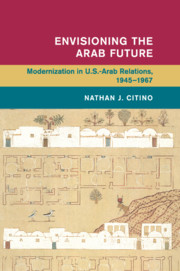Crossref Citations
This Book has been
cited by the following publications. This list is generated based on data provided by Crossref.
Tropp, Jacob
2018.
Transnational development training and Native American ‘laboratories’ in the early Cold War.
Journal of Global History,
Vol. 13,
Issue. 3,
p.
469.
Irwin, Julia F.
2018.
The Development Century.
p.
40.
Marks, Steven G.
2018.
‘The Global Legacy of the Russian Revolution: A Comparative Perspective’.
Revolutionary Russia,
Vol. 31,
Issue. 2,
p.
152.
Immerwahr, Daniel
2020.
Ten-Cent Ideology: Donald Duck Comic Books and the U.S. Challenge to Modernization.
Modern American History,
Vol. 3,
Issue. 1,
p.
1.
Daigle, Craig
2020.
A Companion to U.S. Foreign Relations.
p.
911.
Karam, Jeffrey G.
2021.
Reflections onBeirut Rules: the wider consequences of US foreign and security policy in Lebanon in the 1980s.
Intelligence and National Security,
Vol. 36,
Issue. 3,
p.
431.
Ajl, Max
2021.
Does the Arab region have an agrarian question?.
The Journal of Peasant Studies,
Vol. 48,
Issue. 5,
p.
955.
Meskell, Lynn
and
Luke, Christina
2021.
Developing Petra: UNESCO, the World Bank, and America in the desert.
Contemporary Levant,
Vol. 6,
Issue. 2,
p.
126.
Adalet, Begüm
2021.
Cold War Social Science.
p.
315.
Lawson, Owain
2021.
A National Vocation.
Comparative Studies of South Asia, Africa and the Middle East,
Vol. 41,
Issue. 1,
p.
71.
Bortolini, Matteo
2021.
The Grudging Modernizer: A Trip to the Middle East and Cold War Social Science.
Minerva,
Vol. 59,
Issue. 2,
p.
261.
Luke, Christina
and
Leeson, Madison
2022.
UNESCO-UNDP tourism and security in Cold War Turkey and Iran.
Journal of Heritage Tourism,
Vol. 17,
Issue. 6,
p.
669.
Adalet, Begüm
2022.
Agricultural infrastructures: Land, race, and statecraft in Turkey.
Environment and Planning D: Society and Space,
Vol. 40,
Issue. 6,
p.
975.
Shechter, Relli
2022.
ʿAbd al-ʿAzīz Āl Saʿūd’s Other Campaign: Propaganda in the Making of the Modern Saudi State, 1918–1932.
Journal of Arabian Studies,
Vol. 12,
Issue. 1,
p.
45.
Luke, Christina
and
Meskell, Lynn
2023.
New deals for the past: the Cold War, American archaeology, and UNESCO in Egypt and Syria.
History and Anthropology,
Vol. 34,
Issue. 2,
p.
194.
Albalwi, Wedian
McGovern, Tom
and
Salama, Aly
2024.
Pro-Social Policies and Impression Management: The American Arabian Oil Company (Aramco), 1932–1974.
Enterprise & Society,
Vol. 25,
Issue. 3,
p.
872.
Bhuta, Nehal
2024.
The Cambridge History of International Law.
p.
49.
2024.
The Cambridge History of International Law.
p.
47.
Olson, Kyle
and
Luke, Christina
2024.
Field archaeology and foreign assistance during the decade of development in Iran and Turkey.
History and Anthropology,
Vol. 35,
Issue. 5,
p.
1154.
Khalili, Laleh
2024.
Crude Knowledge: Petro-Periodicals and Resource Sovereignty.
International Journal of Middle East Studies,
Vol. 56,
Issue. 3,
p.
446.



